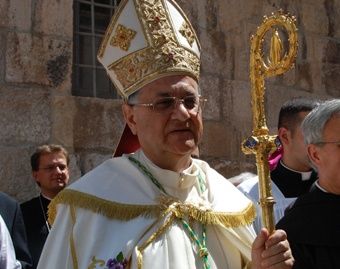
.- The Latin Patriarch of Jerusalem, Archbishop Fouad Twal, has issued a Christmas message that both laments the violence and refugee situation in the Middle East and calls on Christians to live out their faith.,“The joy of Christmas is overshadowed by the staggering violence in Syria,” he said Dec. 20. He noted the Catholic Church’s work to assist 250,000 Syrian refugees in Jordan, saying this shows the Church is “full of compassion for the victims.” Conflict between rebel forces and the Syrian government has killed tens of thousands of people and driven many more from their homes.
The refugees are mainly women and children who need food, shelter, medical treatment and clothes. Caritas Jordan director Wael Suleiman told Fides news agency in November that the Syrian refugees’ numbers in the country could reach half a million by April 2013 if the conflict is not resolved. In addition to the refugees from Syria, there are hundreds of thousands of Iraqi refugees already in Jordan.
Patriarch Twal said that Catholics pray that Jordan will “maintain its stability and common sense.” In the regional picture, there are many concerns surrounding the Middle East situation that leave Christians “perplexed,” but they desire “more stability and democracy,” he said. Patriarch Twal denounced the “severe restrictions” affecting 1.6 million Palestinians, saying they generate “hatred and hostility towards Israel.” He said United Nations recognition of Palestine as a nonmember observer is “a step towards peace and stability.” Israel, he said, can negotiate “on equal state-to-state terms for the good of all.”The Catholic bishops and patriarchs of the Middle East consider the Israel-Palestine conflict as the cause of all conflicts in the region and stress the urgent need for a “just and peaceful solution.” Patriarch Twal urged President Barack Obama to take “immediate action” for a two-state solution. He also spoke of the need for the presence of Christians in public life, pointing to the media as a way for Christian citizens to “assume their historic role,” express values of non-violence and encourage dialogue with believers of other religions. “We are a minority but we are more than just a number,” he said. “I encourage all our faithful to live this Year of Faith in earnest,” he added, invoking the first Christians of Jerusalem as a “model for renewal.” The patriarch thanked those who had participated in interreligious initiatives and stressed the ability of religious leaders to work for peace if they work together. However, he said the meetings did not prevent “an increase in a certain religious radicalism.”
“Interreligious dialogue can only bear fruits in acts of mutual respect,” he said, voicing “dismay” at the ongoing desecrations of churches, convents, synagogues and cemeteries in the Holy Land. In February, the Monastery of the Holy Cross in Jerusalem was vandalized with the words “Death to Christians.” Early in the morning of Sept. 4, vandals set fire to the door of the Latroun Monastery near Jerusalem and spray painted the walls with blasphemous phrases about Jesus in Hebrew. Another vandal attack happened Oct. 2 on the Convent of St. Francis on Mt. Zion, next to the Cenacle complex traditionally regarded as the site of the Last Supper. The graffiti attack derided Jesus and used a phrase common among Israeli extremists for a revenge attack on Palestinians and Arabs.
Such incidents have drawn wide condemnation from other religions and from the Israeli government. Patriarch Twal called for education of young people in schools to “take out the evil at its root.”
Turning to other interreligious issues, the patriarch said the 50th anniversary of the Second Vatican Council is a chance for “an examination of conscience” about Catholics’ dialogue with Judaism and Islam.
Christian ecumenical events in the past year have included the Russian Orthodox Patriarch Kiril of Moscow’s visit in early November. Holy Land Catholic leaders reached an agreement to celebrate Easter on a common date in the region. Many Christian delegations attended the enthronement of Coptic Orthodox Pope Tawadros II in Cairo.
Christian emigration is a problem for the Middle East, but Patriarch Twal said such emigration is slowing. He noted Church efforts to provide housing and job training for young people. Most immigrants into the patriarchate are Christians, he said.
In addition to issuing a Christmas message, Patriarch Twal officiated at the first ever Christmas tree lighting at Jerusalem’s Jaffa Gate on Dec. 18 with other bishops, priests, vowed religious and lay faithful.



